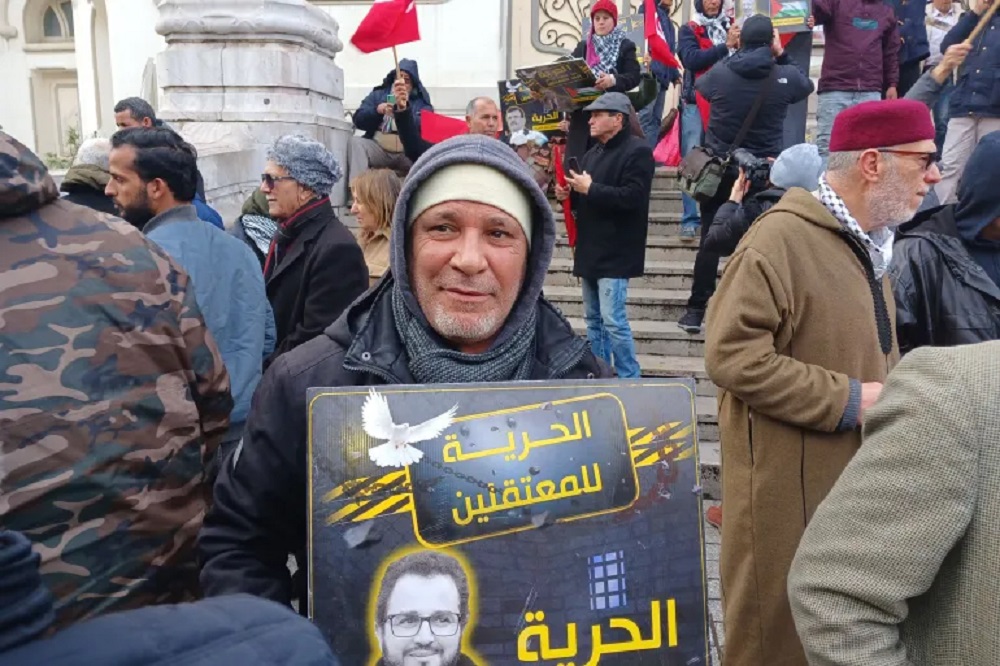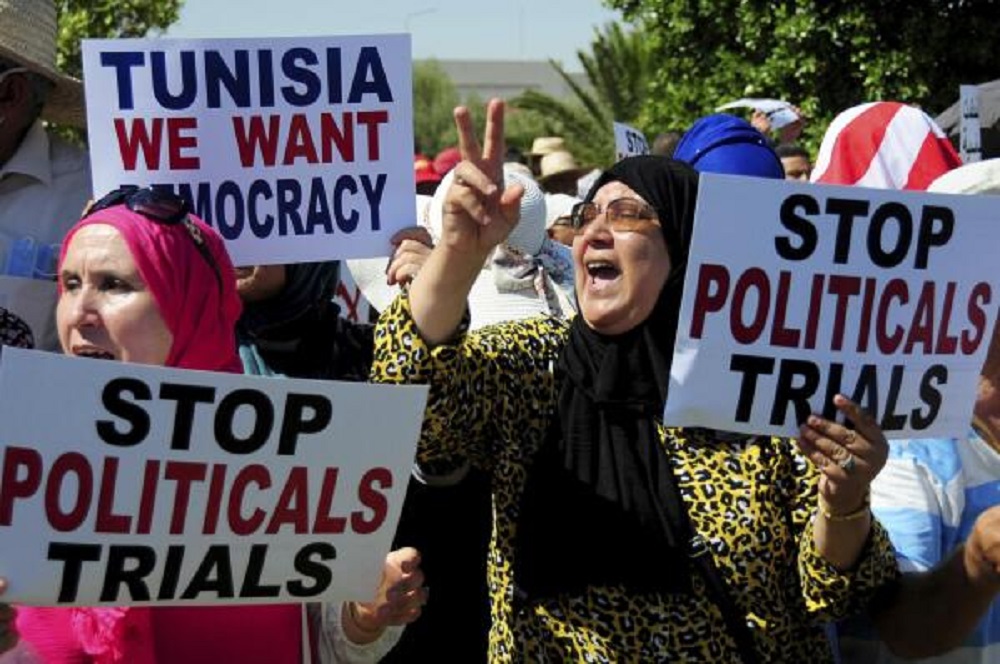Watan-The Tunisian opposition coalition, the National Salvation Front, has called for a protest to be held in the capital on Wednesday, coinciding with Martyrs’ Day, observed annually on April 9. In its statement, the Front said the call comes “in protest against the worsening political and economic situation in the country, the repeated violations of human rights and freedoms, and to demand the release of all political prisoners and prisoners of conscience, as well as in solidarity with the Palestinian people amid the genocide they are facing.”
The Front expressed its full solidarity with political detainee Jawhar Ben Mbarek, who began an open hunger strike on Sunday, March 30, in protest of being excluded from his own trial and the ongoing policy of secrecy surrounding the hearings in the so-called “conspiracy case.” The Front considered these actions to be a targeting of political opposition and a violation of political and civil rights.
The Front also affirmed its firm rejection of political interference in the judiciary, stating that the executive authority is attempting to control the courts and using intimidation tactics such as arbitrary dismissals and transfers of judges. The statement called for live broadcasting of court sessions on national television to allow the public—domestically and internationally—to witness the extent of misinformation being promoted by the authorities. It urged “all freedom supporters across the political spectrum and civil society” to mobilize on April 11 to demand fair trial guarantees and to reject the use of the judiciary as a tool in political disputes.

The Bhiri Case
Separately, former Minister of Justice and deputy leader of the Ennahda Movement, Noureddine Bhiri, appeared today before the Court of Appeals over a Facebook post that Ennahda described as “a fabricated post.” The movement stated that he had already been unjustly sentenced to 10 years in prison in a previous ruling.
In a statement issued Monday, Ennahda reiterated its strong condemnation of the unfair verdict against Bhiri, asserting that it lacked the basic standards of a fair trial, as previously outlined by his legal defense team. The party also stressed the need for an investigation into the violent circumstances of his arrest, which led to a fractured shoulder and his forcible detention prior to his official custody.
Ennahda demanded Bhiri’s immediate release and an end to what it called his “ongoing mistreatment,” especially given the technical evidence showing no confirmation of the alleged post and the absence of any intent to undermine the state. The movement called for respect for freedom of expression and the right to peaceful opposition, as guaranteed by constitutions and international charters.
Hunger Strike and the Return to the Streets
Senior Ennahda and National Salvation Front leader Riadh Chaibi stated that in a situation where authorities are unresponsive to public calls, “a political detainee has nothing left but his own body and life to place on the line to make his voice heard.” He added that Jawhar Ben Mbarek, a law professor, was pushed to go on hunger strike after witnessing a blatant violation of defense rights and the guarantees of a fair trial, particularly the decision to hold trials remotely and deny face-to-face confrontation in court.
Chaibi urged Ben Mbarek to end his hunger strike for the sake of his health and well-being. Speaking on behalf of himself and others who support freedom and justice, he affirmed their continued commitment to defending Ben Mbarek’s rights, standing with all those unjustly detained, and pushing for their release along with the restoration of the democratic process.
Regarding the return of the National Salvation Front to street protests, Chaibi said:“The Front continues its struggle to protest the serious setbacks to democratic gains and to demand a return to the democratic path and the release of all political detainees. At a time when we hoped for national unity in the face of challenges, we find ourselves confronted with an authoritarian, divisive, and hostile rhetoric against anyone who disagrees.”
He added:“We’re back in the streets to make our voices heard—voices rejecting the regime’s policies and calling for an end to the manipulation of the country’s interests and the unity of its people. We are pushing to reclaim all the democratic achievements rolled back since the power grab of July 25, 2021.”
Chaibi emphasized that the current government has plunged the country into a dark tunnel of overlapping crises—economic, political, societal, and even in foreign relations, which are usually considered the most stable area of state policy.
Conspiracy Case and Upcoming Trials
As for the second trial session in the so-called conspiracy against state security case, scheduled for April 11, Chaibi—who is being prosecuted while out on bail—stated:
“The second session will be held this Friday, but the court has rejected all defense requests: whether to recuse itself, cancel the remote trial, or release the detainees—despite their two-year detention without valid justification, other than political vengeance.”
He continued:“Unfortunately, the court has not responded to any of the demands presented by more than a hundred lawyers who attended the first session. Therefore, we, the defendants out on bail, are leaning toward boycotting the session, both in solidarity with those excluded from the hearing and because we have not received any official summons, as required by law.”
Regarding Bhiri’s new court appearance, Chaibi said:“We have entered a season of political trials, following over two years of arrests. Trials are multiplying, and unjust verdicts are starting to be issued—including the initial 10-year sentence against Bhiri for a post the court couldn’t even verify. Now he appears again before the Court of Appeals after challenging that ruling.”
Chaibi concluded that these trials expose two things:
-
The government is pressuring the judiciary, pushing it to rush final judgments without allowing proper legal defense procedures.
-
The sentences are harsh and disproportionate, intended to punish and intimidate opposition figures.
